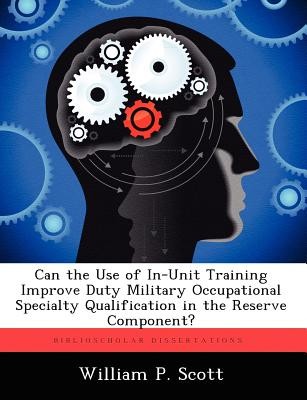
- We will send in 10–14 business days.
- Author: William P Scott
- Publisher: BiblioScholar
- ISBN-10: 1249363721
- ISBN-13: 9781249363729
- Format: 18.9 x 24.6 x 0.4 cm, softcover
- Language: English
- SAVE -10% with code: EXTRA
Can the Use of In-Unit Training Improve Duty Military Occupational Specialty Qualification in the Reserve Component? (e-book) (used book) | bookbook.eu
Reviews
Description
Reserve Component (RC) soldiers often attend reclassification training. Reclassification training is required any time a soldier is assigned to a position for which he does not posses the correct Military Occupational Specialty Qualification (MOSQ). Because RC soldiers often change assignments for a number of reasons, such as civilian job location changes or attendance at college, it generates significant reclassification requirements. The current program to train all these requirements has not yielded the appropriate training readiness levels. This thesis will propose an additional method to assist in reclassification training. In-unit training is a method of training that would provide flexibility to unit commanders to schedule and conduct reclassification training to cover gaps in the current education system to more closely align with the yearly training schedule. In-unit training is conducted by the unit, with school certified instructors and with the oversight of accredited training institutions. This provides the commander the ability to radically increase duty MOSQ and better support the increasing reliance of the RC to activate and deploy in support of the operational needs of the Army.
EXTRA 10 % discount with code: EXTRA
The promotion ends in 17d.09:47:02
The discount code is valid when purchasing from 10 €. Discounts do not stack.
- Author: William P Scott
- Publisher: BiblioScholar
- ISBN-10: 1249363721
- ISBN-13: 9781249363729
- Format: 18.9 x 24.6 x 0.4 cm, softcover
- Language: English English
Reserve Component (RC) soldiers often attend reclassification training. Reclassification training is required any time a soldier is assigned to a position for which he does not posses the correct Military Occupational Specialty Qualification (MOSQ). Because RC soldiers often change assignments for a number of reasons, such as civilian job location changes or attendance at college, it generates significant reclassification requirements. The current program to train all these requirements has not yielded the appropriate training readiness levels. This thesis will propose an additional method to assist in reclassification training. In-unit training is a method of training that would provide flexibility to unit commanders to schedule and conduct reclassification training to cover gaps in the current education system to more closely align with the yearly training schedule. In-unit training is conducted by the unit, with school certified instructors and with the oversight of accredited training institutions. This provides the commander the ability to radically increase duty MOSQ and better support the increasing reliance of the RC to activate and deploy in support of the operational needs of the Army.


Reviews